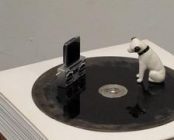[dropcap style=”font-size:100px; color:#992211;”]T[/dropcap]here’s a chipshop in space that sells spaceship-shaped chips.
Turns out that tonguetwisters twist the thoughts too.
Tongue twisters are not just fun to say; it turns out that these sound-related slip-ups can also open windows into the brain’s speech-planning processes. A team from the Massachusetts Institute of Technology (MIT) will report new insights gleaned from a comparison of two types of tongue twisters at the 166th meeting of the Acoustical Society of America (ASA), held Dec. 2-6, 2013, in San Francisco, Calif.
Stefanie Shattuck-Hufnagel, an MIT psychologist who will present this work, studies speech errors as a way of understanding normal brain functions. “When things go wrong, that can tell you something about how the typical, error-free operation should go,” she said.
Combinations of sounds
For centuries, people have noticed that when certain combinations of sounds are spoken too quickly, people seem to lose control of their mouths. Often, one sound seems to replace another:
“Toy boat” becomes “toy boyt.”
“Top cop” becomes “cop cop.”
“The seething sea ceaseth and thus the seething sea sufficeth us” becomes a mess of misplaced “s’s” and “th’s.”
But when scientists recorded the misspoken sounds and analyzed them, they found that the errors were not always straightforward sound replacements. At least some of the time, the mistakes didn’t seem to be quite one sound or another, but something in between. And there were different flavors of in between: in the “top cop” example, sometimes the “t” and the “c” seemed to arrive almost at the same time (sort of “tkop”) and sometimes there was a delay between the two, with space for a vowel (“tah-kop”). Linguists refer to these double sound mistakes as double onsets.
In their recent study, the team from MIT – along with their colleagues at Haskins Laboratories in New Haven, Conn., Ludwig-Maximilians University in Munich, Wellesley College in Massachusetts, and the University of Southern California (USC) in Los Angeles – tried to determine whether they could induce different types of double onset with different types of tongue twisters.
Inversion
The researchers recorded volunteers saying combinations of alternating words that fell into two categories: simple lists of words, such as the “top cop” example above, and full-sentence versions of the same sounds with an inversion, such as “the top cop saw a cop top.”
One particular list of words turned out to be so difficult that the test subjects couldn’t even get through it. The phrase was “pad kid poured curd pulled cod,” and when volunteers tried it, Shattuck-Hufnagel said, some of them simply stopped talking altogether. “If anyone can say this [phrase] ten times quickly, they get a prize,” she said.
After recording their volunteers’ efforts, the researchers analyzed the sounds to see what errors people had produced. They found that in the word list tongue twisters, there was a preponderance of the “t’kop errors.” In contrast, the sentence twisters induced more of the “tah-kop”-type errors, with the longer delay and the presence of a short vowel after the consonant.
Brain processes
Though it is too early to say exactly what is responsible for these differences, Shattuck-Hufnagel said, one possible factor is the regular rhythm of the word lists compared to the more irregular timing of the sentences. But the fact that both types of errors occur for sentences as well as word lists suggests that there is some overlap between the brain processes used to produce these two types of speech. “You can get both kinds of errors in both kinds of planning,” she said, but the different proportion of errors indicates key differences as well.
The MIT team, working with colleagues at Haskins Laboratories, Ludwig-Maximilians University in Munich, and USC, has already collected data for the next stage of this study, in which tiny transducers are placed on people’s tongues to measure their articulation. The researchers hope to use this work to find the ghosts of double onsets, in which the tongue has tried to make both a “t” and “k” but only one sound is heard. If these double onsets are indeed more likely to be produced by word list twisters than by sentence twisters, Shattuck-Hufnagel said, then this work will help scientists understand how the brain plans these two types of speech.
Source: American Institute of Physics
Photo: Freedigitalphotos.net/Imagerymajestic

Some of the news that we find inspiring, diverting, wrong or so very right.



















